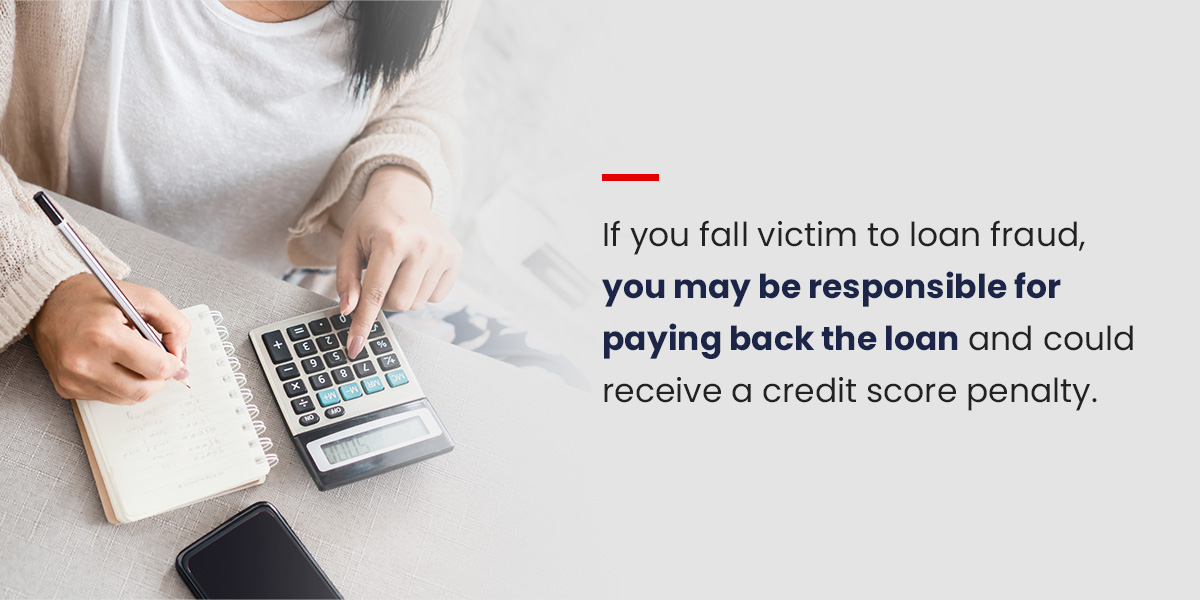
Identity theft and fraud are prevalent in the U.S. and worldwide. In 2022, the Federal Trade Commission received 5.1 million reports of fraud, and 1.1 million related to identity theft alone. These cases continue increasing, primarily due to technological advances and competitive lending.
Loan fraud is the third most prevalent form of identity theft. While criminals tend to target specific age groups, they do not discriminate, so it's wise to understand the various methods they use and how to prevent identity theft.
What Is Loan Fraud?
Loan fraud is when a thief illegally uses your information to get a loan. While there are several types, payday loans are the most common because they require little personal information to acquire.
Criminals can gain access to stolen personal information and identities through various channels.
- Criminal marketplaces: Platforms on the dark web offer the opportunity to sign in anonymously, pay using untraceable means, and buy IDs for illegal use.
- Data breaches: Fraudsters can benefit when hackers breach data because they gain access to IDs and passwords. They can use this information to gain access to more personal data to create a complete stolen ID profile.
- Phishing: Criminals use sophisticated techniques to pose as reputable people or institutions. These methods might include an email advertising a job opportunity or loan application.
- Rent and ID service: Some people willingly rent their official documents for others to use. Their information goes straight into fraudsters' hands.
Who Can Be a Victim of Loan Fraud?
Anyone can fall victim to loan fraudsters, but most people they prey on have established credit scores. In 2022, out of the 153,547 people who reported loan fraud, 49,243 were between 30 and 39 years old.
Children and older adults are also easy targets for fraudsters, as they may not understand specific financial situations and bills. People who handle their care and finances may even take advantage of them. Children can become fraud victims at a young age and only become aware of it later in life. Meanwhile, seniors often provide a lot of easily accessible information to hospitals, caregivers, and doctors.
Why Does Loan Fraud Occur?
Access to quick money is attractive to criminals. As companies compete to offer fast and frictionless lending, they tend to accelerate the credit scoring process. Fewer verifications make it easier for fraudsters to take advantage.
Some lenders use ineffective verification tools like outdated databases, which sophisticated criminals can easily outsmart. Often, lending companies rely on credit bureaus, but this becomes a problem when they service unbanked people.
Many lending companies only require a small amount of information for loan applications. If a fraudster has your Social Security or bank account number, they may be able to get a quick loan. Payday loans are easier for fraudsters to obtain because they require few specifics. However, they can get a much more significant loan with enough stolen information.
Growing internet access, increased mobile use, and affordable tech make for a relatively risk-free environment for criminals to thrive. They can easily change devices, IDs, and IP addresses to multiply their loan applications.
What Is the Impact of Loan Fraud?

Loan fraud affects banks, lending agencies, and governments, but can also severely harm your financial standing. The impact can range from a criminal obtaining multiple payday loans to a legitimate car, business, or home loan.
If you fall victim to loan fraud, you may be responsible for paying back the loan and could receive a credit score penalty. If you fail to repay the loan, you could also face criminal prosecution. It can be challenging to track down the fraud, but most victims can prove the identity theft. However, this stressful process can still have long-term effects on your credit score.
What to Do if You Detect Fraud
If you believe you have experienced identity theft, you must act immediately to protect yourself and your credit.
- Review your free credit reports from Experian, Equifax, and TransUnion. It's essential to check all three, as the information may differ. Record any fraudulent accounts that you didn't open. Once you know what you want to dispute, notify these bureaus and start the process.
- Create an identity theft report with the FTC. You can also file a police report. Most banks and debt collectors need this official documentation for their records as they resolve disputes.
- Contact the lender to report the fraudulent loan. The lender should then close the loan and send you confirmation.
Tips to Prevent Identity Theft
Fraudulent loans can go undetected for months or years. The best way to protect yourself is to be proactive. Here are some identity theft prevention steps to take.
1. Track Your Credit Report and Bank Statements
Most major credit card issuers offer free access to your credit score. You can also request free credit reports from the three credit bureaus. Review your credit report and bank statement to identify unusual transactions or unauthorized access.
2. Set Fraud Alerts
Setting up a fraud alert notifies other lenders that you are an identity theft victim. Lenders will then take extra precautions to confirm loan applications with you, such as calling the number on file with the bureaus to verify your identity.
3. Freeze Your Credit
A credit freeze blocks fraudsters from taking out loans using your identity. You will need to freeze your credit with each of the bureaus. If you ever need to apply for credit, you can temporarily lift the freeze.
4. Learn Warning Signs
Stay up to date with various identity theft methods. Criminals commonly use data phishing to acquire information via SMS, email, or personal visits. Other underhanded approaches include deepfake AI technology, synthetic identity fraud, and predatory loan apps that post attractive zero-interest rates. If it sounds too good to be true, it probably is.
5. Avoid Saving Banking or Credit Details Online
Online stores may ask if you want to store your banking details by creating an account. Doing so may be convenient, but these sites are vulnerable to hackers. Use a guest profile to make your purchases instead.
6. Keep Your Information Safe
Avoid sharing your details over the phone or online unless you have a trusted relationship with the person. Be wary of strangers contacting you for information. Always use safe password practices by creating hard-to-guess passwords for your accounts and storing them securely.
Ask Our Reps About Identity Theft Protection Offered With Your Personal Loan
Identity theft can happen to anyone. As technology advances and loans become more accessible, criminals find new ways to commit loan fraud. Staying ahead of fraudsters is essential to protect your identity and prevent false accounts in your name. Prevention is the best way to keep your identity safe.
At Atlas Credit, we provide quick, simple loan applications while keeping your information secure. Meet your financial needs while repaying the loan in smaller, affordable amounts. Begin your loan approval process today, and one of our customer service reps will call you for verification!



